Legal Analysis: Contracts between Hercules, Xena, and Hydra Mechanics
VerifiedAdded on 2023/02/01
|10
|1923
|42
Report
AI Summary
This report analyzes a complex contract law scenario involving Hercules, Xena, and Hydra Mechanics (HM). The report examines the validity of an offer's acceptance, specifically whether a telephone acceptance was valid when the offer stipulated acceptance via contract exchange at a specific location and time. It then assesses whether Hercules can claim damages from HM due to a delay in car repairs that caused Hercules to miss the contract exchange, applying the principles of Hadley v Baxendale. Finally, the report investigates the validity of an exclusion clause posted by HM, considering its incorporation, legality, and clarity, particularly regarding negligence. The analysis incorporates relevant case law and legal principles to provide a comprehensive understanding of the contractual obligations and potential liabilities of each party involved.

Report 1
REPORT (1200 words)
Student Name:
Date:
Institution:
REPORT (1200 words)
Student Name:
Date:
Institution:
Paraphrase This Document
Need a fresh take? Get an instant paraphrase of this document with our AI Paraphraser
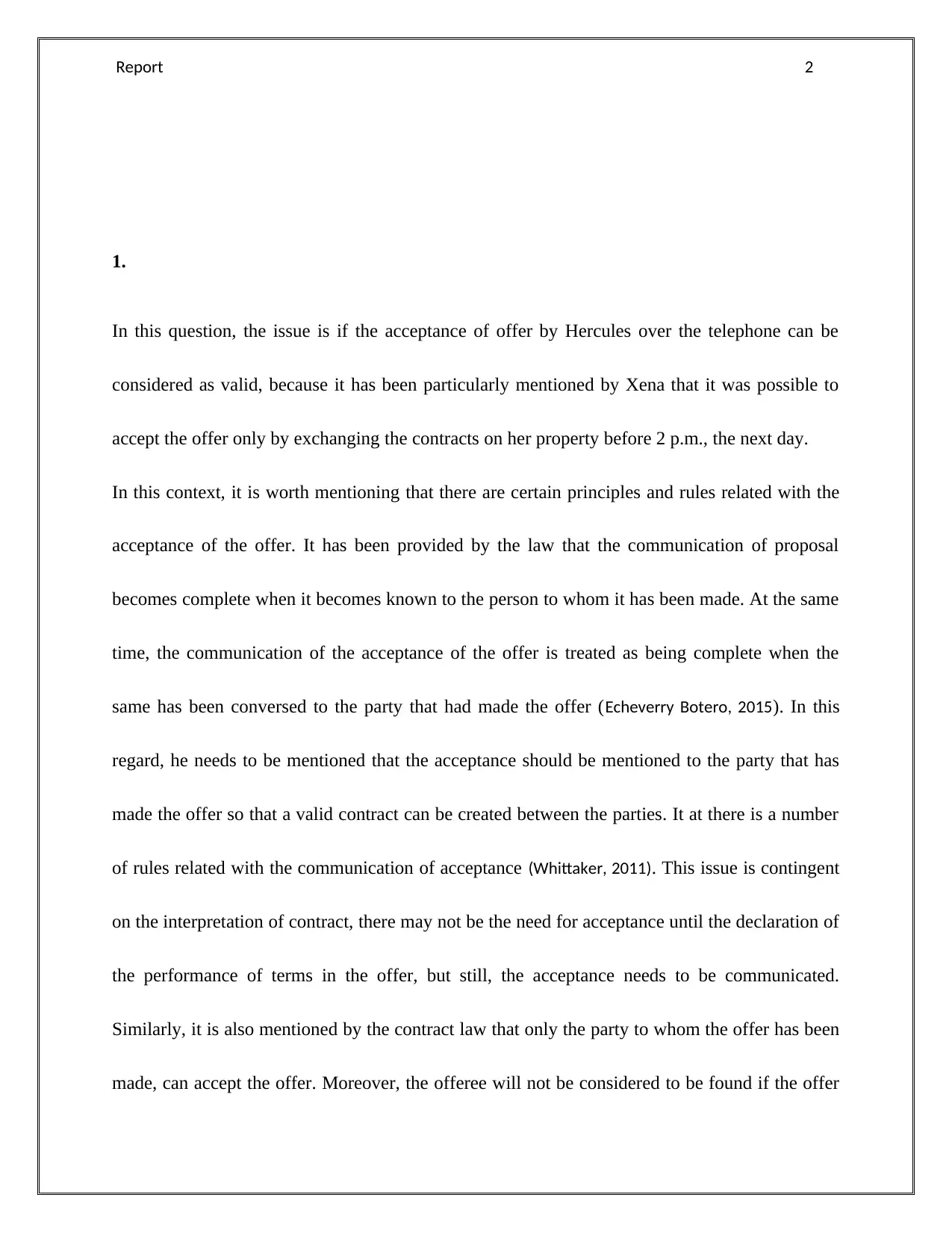
Report 2
1.
In this question, the issue is if the acceptance of offer by Hercules over the telephone can be
considered as valid, because it has been particularly mentioned by Xena that it was possible to
accept the offer only by exchanging the contracts on her property before 2 p.m., the next day.
In this context, it is worth mentioning that there are certain principles and rules related with the
acceptance of the offer. It has been provided by the law that the communication of proposal
becomes complete when it becomes known to the person to whom it has been made. At the same
time, the communication of the acceptance of the offer is treated as being complete when the
same has been conversed to the party that had made the offer (Echeverry Botero, 2015). In this
regard, he needs to be mentioned that the acceptance should be mentioned to the party that has
made the offer so that a valid contract can be created between the parties. It at there is a number
of rules related with the communication of acceptance (Whittaker, 2011). This issue is contingent
on the interpretation of contract, there may not be the need for acceptance until the declaration of
the performance of terms in the offer, but still, the acceptance needs to be communicated.
Similarly, it is also mentioned by the contract law that only the party to whom the offer has been
made, can accept the offer. Moreover, the offeree will not be considered to be found if the offer
1.
In this question, the issue is if the acceptance of offer by Hercules over the telephone can be
considered as valid, because it has been particularly mentioned by Xena that it was possible to
accept the offer only by exchanging the contracts on her property before 2 p.m., the next day.
In this context, it is worth mentioning that there are certain principles and rules related with the
acceptance of the offer. It has been provided by the law that the communication of proposal
becomes complete when it becomes known to the person to whom it has been made. At the same
time, the communication of the acceptance of the offer is treated as being complete when the
same has been conversed to the party that had made the offer (Echeverry Botero, 2015). In this
regard, he needs to be mentioned that the acceptance should be mentioned to the party that has
made the offer so that a valid contract can be created between the parties. It at there is a number
of rules related with the communication of acceptance (Whittaker, 2011). This issue is contingent
on the interpretation of contract, there may not be the need for acceptance until the declaration of
the performance of terms in the offer, but still, the acceptance needs to be communicated.
Similarly, it is also mentioned by the contract law that only the party to whom the offer has been
made, can accept the offer. Moreover, the offeree will not be considered to be found if the offer
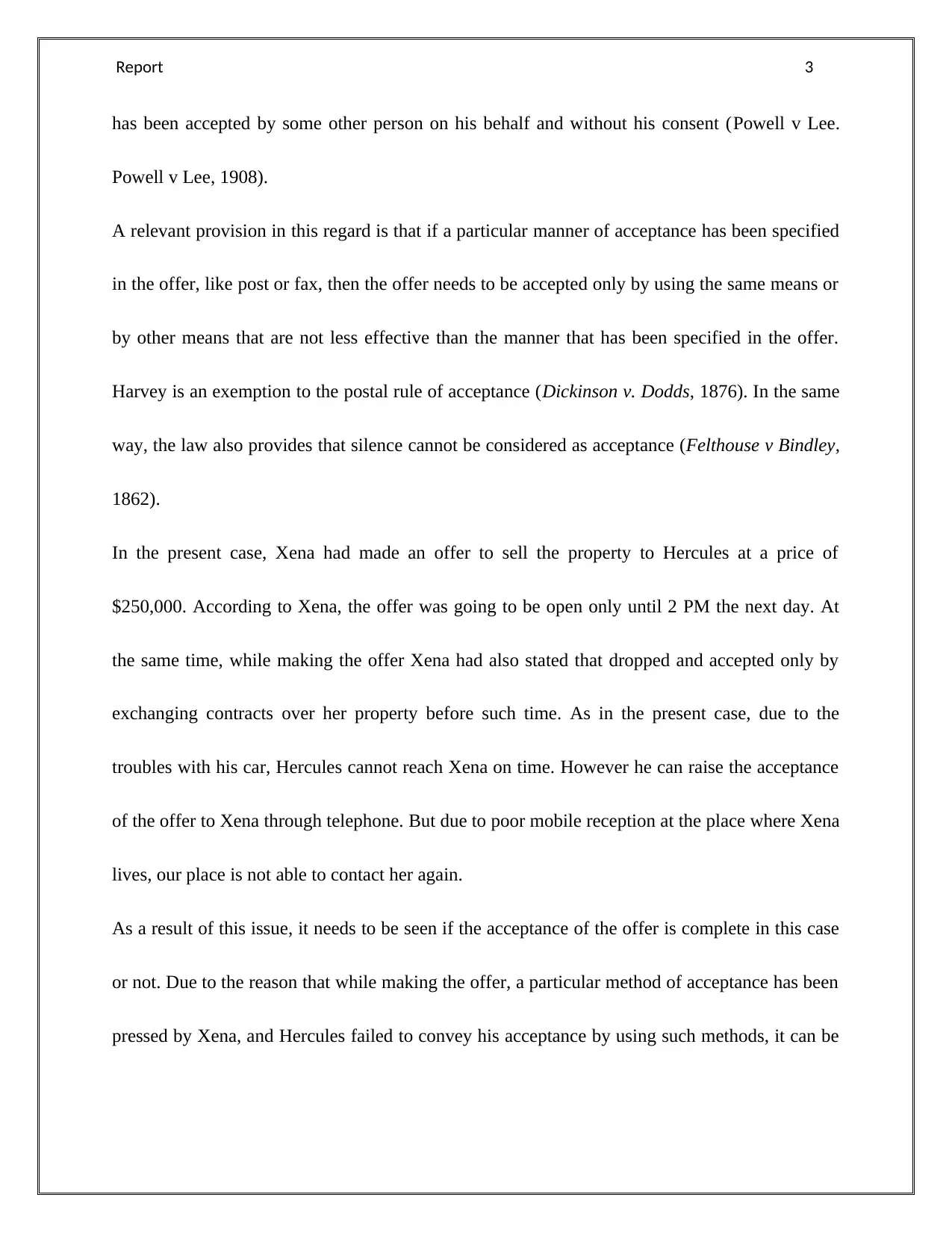
Report 3
has been accepted by some other person on his behalf and without his consent (Powell v Lee.
Powell v Lee, 1908).
A relevant provision in this regard is that if a particular manner of acceptance has been specified
in the offer, like post or fax, then the offer needs to be accepted only by using the same means or
by other means that are not less effective than the manner that has been specified in the offer.
Harvey is an exemption to the postal rule of acceptance (Dickinson v. Dodds, 1876). In the same
way, the law also provides that silence cannot be considered as acceptance (Felthouse v Bindley,
1862).
In the present case, Xena had made an offer to sell the property to Hercules at a price of
$250,000. According to Xena, the offer was going to be open only until 2 PM the next day. At
the same time, while making the offer Xena had also stated that dropped and accepted only by
exchanging contracts over her property before such time. As in the present case, due to the
troubles with his car, Hercules cannot reach Xena on time. However he can raise the acceptance
of the offer to Xena through telephone. But due to poor mobile reception at the place where Xena
lives, our place is not able to contact her again.
As a result of this issue, it needs to be seen if the acceptance of the offer is complete in this case
or not. Due to the reason that while making the offer, a particular method of acceptance has been
pressed by Xena, and Hercules failed to convey his acceptance by using such methods, it can be
has been accepted by some other person on his behalf and without his consent (Powell v Lee.
Powell v Lee, 1908).
A relevant provision in this regard is that if a particular manner of acceptance has been specified
in the offer, like post or fax, then the offer needs to be accepted only by using the same means or
by other means that are not less effective than the manner that has been specified in the offer.
Harvey is an exemption to the postal rule of acceptance (Dickinson v. Dodds, 1876). In the same
way, the law also provides that silence cannot be considered as acceptance (Felthouse v Bindley,
1862).
In the present case, Xena had made an offer to sell the property to Hercules at a price of
$250,000. According to Xena, the offer was going to be open only until 2 PM the next day. At
the same time, while making the offer Xena had also stated that dropped and accepted only by
exchanging contracts over her property before such time. As in the present case, due to the
troubles with his car, Hercules cannot reach Xena on time. However he can raise the acceptance
of the offer to Xena through telephone. But due to poor mobile reception at the place where Xena
lives, our place is not able to contact her again.
As a result of this issue, it needs to be seen if the acceptance of the offer is complete in this case
or not. Due to the reason that while making the offer, a particular method of acceptance has been
pressed by Xena, and Hercules failed to convey his acceptance by using such methods, it can be
⊘ This is a preview!⊘
Do you want full access?
Subscribe today to unlock all pages.

Trusted by 1+ million students worldwide
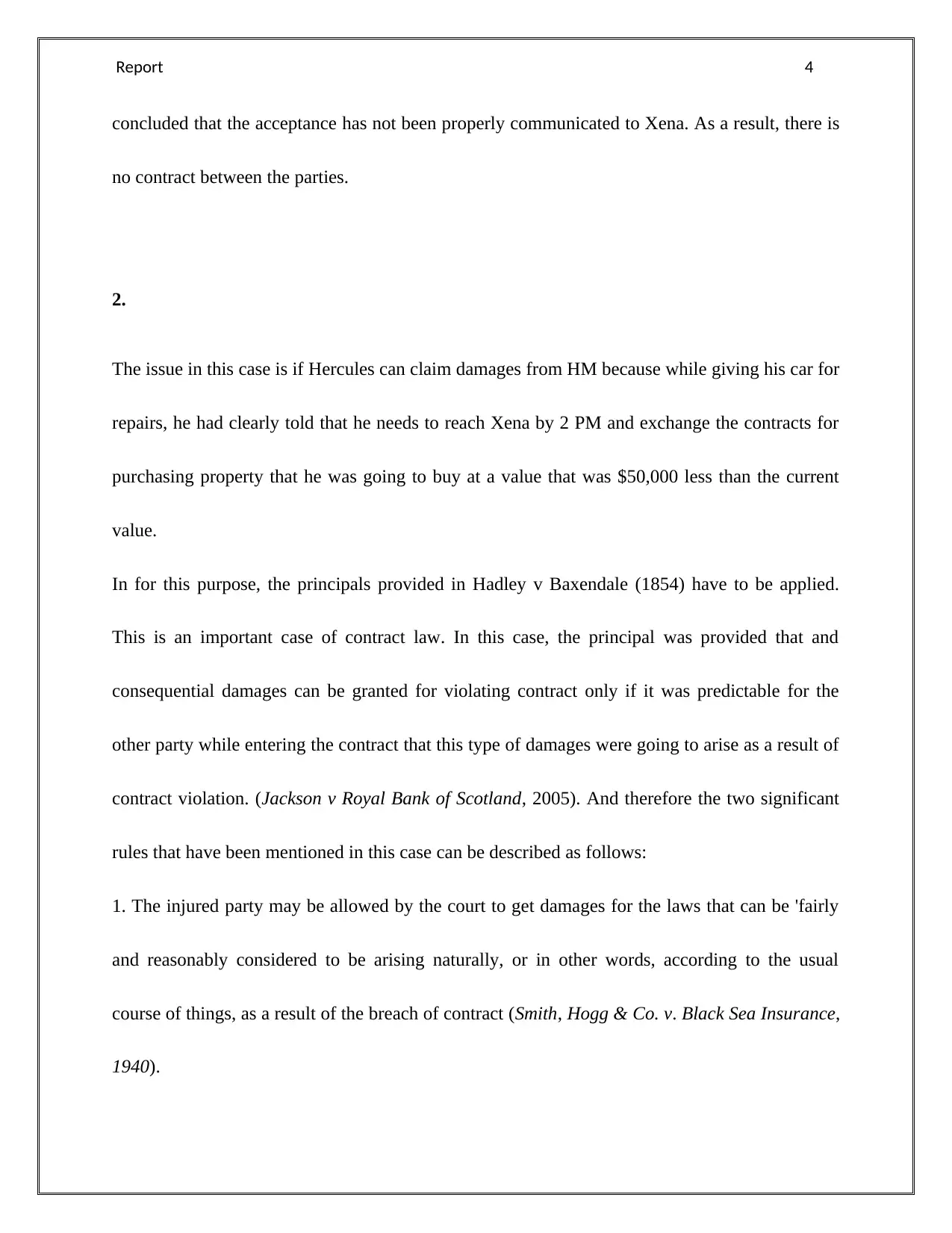
Report 4
concluded that the acceptance has not been properly communicated to Xena. As a result, there is
no contract between the parties.
2.
The issue in this case is if Hercules can claim damages from HM because while giving his car for
repairs, he had clearly told that he needs to reach Xena by 2 PM and exchange the contracts for
purchasing property that he was going to buy at a value that was $50,000 less than the current
value.
In for this purpose, the principals provided in Hadley v Baxendale (1854) have to be applied.
This is an important case of contract law. In this case, the principal was provided that and
consequential damages can be granted for violating contract only if it was predictable for the
other party while entering the contract that this type of damages were going to arise as a result of
contract violation. (Jackson v Royal Bank of Scotland, 2005). And therefore the two significant
rules that have been mentioned in this case can be described as follows:
1. The injured party may be allowed by the court to get damages for the laws that can be 'fairly
and reasonably considered to be arising naturally, or in other words, according to the usual
course of things, as a result of the breach of contract (Smith, Hogg & Co. v. Black Sea Insurance,
1940).
concluded that the acceptance has not been properly communicated to Xena. As a result, there is
no contract between the parties.
2.
The issue in this case is if Hercules can claim damages from HM because while giving his car for
repairs, he had clearly told that he needs to reach Xena by 2 PM and exchange the contracts for
purchasing property that he was going to buy at a value that was $50,000 less than the current
value.
In for this purpose, the principals provided in Hadley v Baxendale (1854) have to be applied.
This is an important case of contract law. In this case, the principal was provided that and
consequential damages can be granted for violating contract only if it was predictable for the
other party while entering the contract that this type of damages were going to arise as a result of
contract violation. (Jackson v Royal Bank of Scotland, 2005). And therefore the two significant
rules that have been mentioned in this case can be described as follows:
1. The injured party may be allowed by the court to get damages for the laws that can be 'fairly
and reasonably considered to be arising naturally, or in other words, according to the usual
course of things, as a result of the breach of contract (Smith, Hogg & Co. v. Black Sea Insurance,
1940).
Paraphrase This Document
Need a fresh take? Get an instant paraphrase of this document with our AI Paraphraser
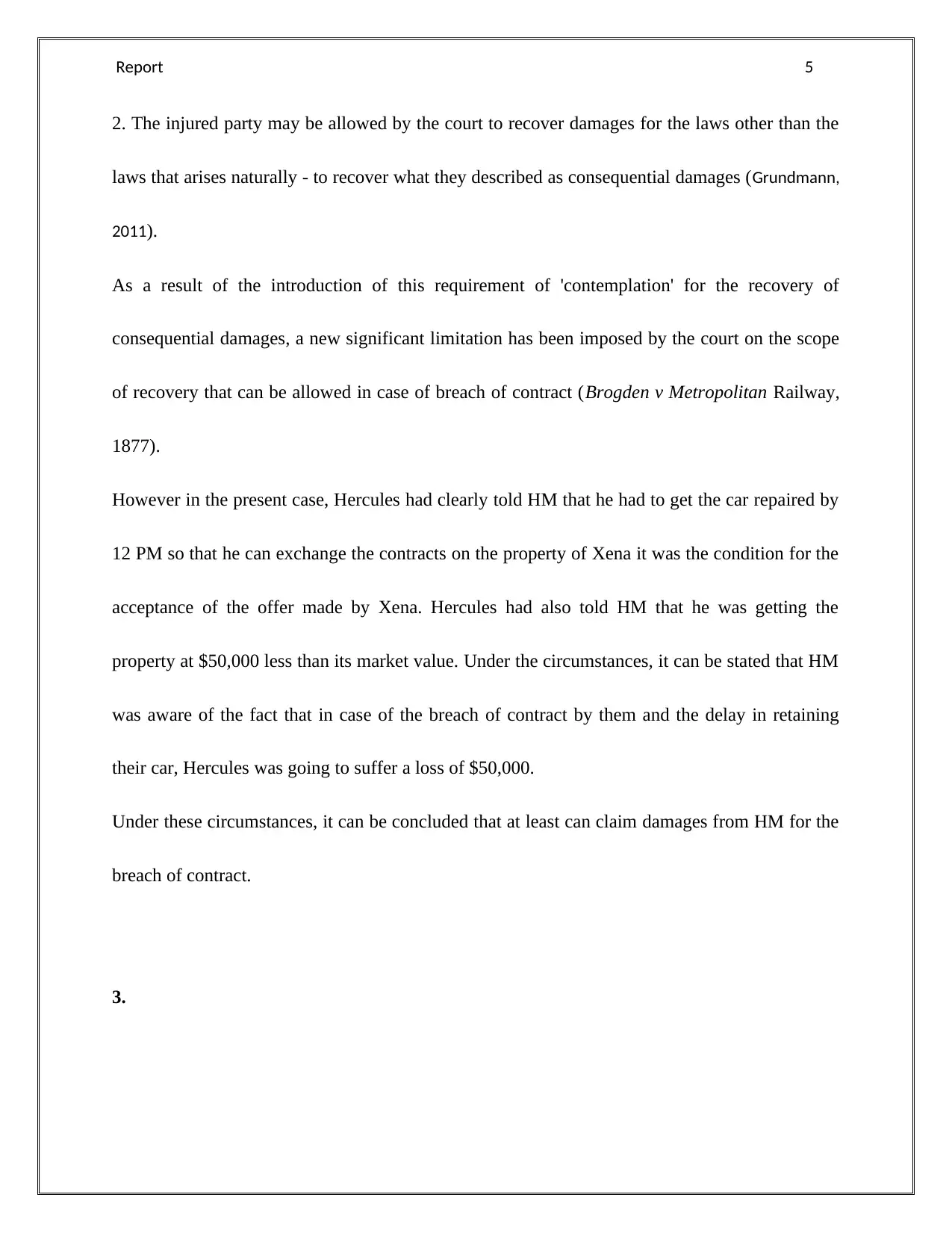
Report 5
2. The injured party may be allowed by the court to recover damages for the laws other than the
laws that arises naturally - to recover what they described as consequential damages (Grundmann,
2011).
As a result of the introduction of this requirement of 'contemplation' for the recovery of
consequential damages, a new significant limitation has been imposed by the court on the scope
of recovery that can be allowed in case of breach of contract (Brogden v Metropolitan Railway,
1877).
However in the present case, Hercules had clearly told HM that he had to get the car repaired by
12 PM so that he can exchange the contracts on the property of Xena it was the condition for the
acceptance of the offer made by Xena. Hercules had also told HM that he was getting the
property at $50,000 less than its market value. Under the circumstances, it can be stated that HM
was aware of the fact that in case of the breach of contract by them and the delay in retaining
their car, Hercules was going to suffer a loss of $50,000.
Under these circumstances, it can be concluded that at least can claim damages from HM for the
breach of contract.
3.
2. The injured party may be allowed by the court to recover damages for the laws other than the
laws that arises naturally - to recover what they described as consequential damages (Grundmann,
2011).
As a result of the introduction of this requirement of 'contemplation' for the recovery of
consequential damages, a new significant limitation has been imposed by the court on the scope
of recovery that can be allowed in case of breach of contract (Brogden v Metropolitan Railway,
1877).
However in the present case, Hercules had clearly told HM that he had to get the car repaired by
12 PM so that he can exchange the contracts on the property of Xena it was the condition for the
acceptance of the offer made by Xena. Hercules had also told HM that he was getting the
property at $50,000 less than its market value. Under the circumstances, it can be stated that HM
was aware of the fact that in case of the breach of contract by them and the delay in retaining
their car, Hercules was going to suffer a loss of $50,000.
Under these circumstances, it can be concluded that at least can claim damages from HM for the
breach of contract.
3.
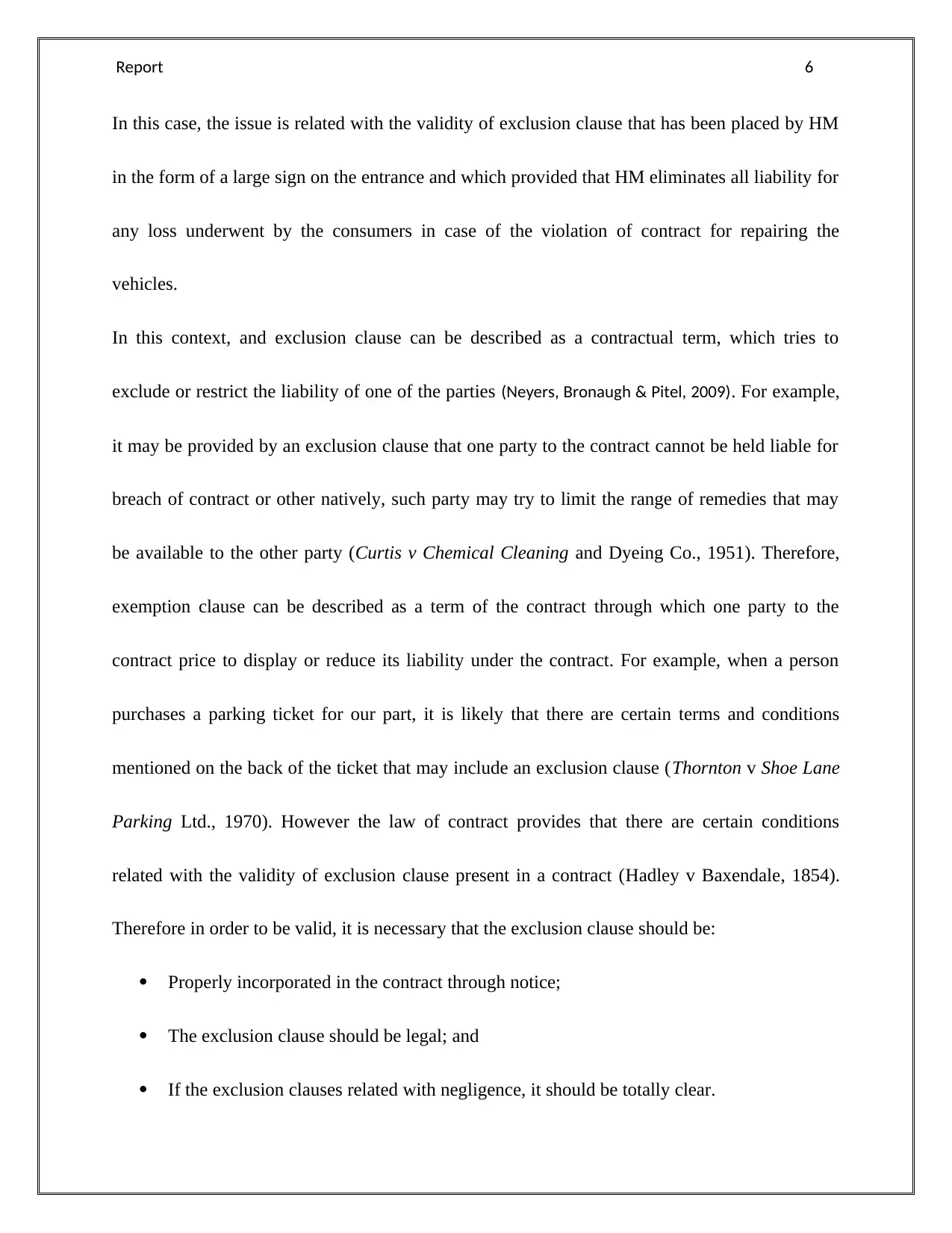
Report 6
In this case, the issue is related with the validity of exclusion clause that has been placed by HM
in the form of a large sign on the entrance and which provided that HM eliminates all liability for
any loss underwent by the consumers in case of the violation of contract for repairing the
vehicles.
In this context, and exclusion clause can be described as a contractual term, which tries to
exclude or restrict the liability of one of the parties (Neyers, Bronaugh & Pitel, 2009). For example,
it may be provided by an exclusion clause that one party to the contract cannot be held liable for
breach of contract or other natively, such party may try to limit the range of remedies that may
be available to the other party (Curtis v Chemical Cleaning and Dyeing Co., 1951). Therefore,
exemption clause can be described as a term of the contract through which one party to the
contract price to display or reduce its liability under the contract. For example, when a person
purchases a parking ticket for our part, it is likely that there are certain terms and conditions
mentioned on the back of the ticket that may include an exclusion clause (Thornton v Shoe Lane
Parking Ltd., 1970). However the law of contract provides that there are certain conditions
related with the validity of exclusion clause present in a contract (Hadley v Baxendale, 1854).
Therefore in order to be valid, it is necessary that the exclusion clause should be:
Properly incorporated in the contract through notice;
The exclusion clause should be legal; and
If the exclusion clauses related with negligence, it should be totally clear.
In this case, the issue is related with the validity of exclusion clause that has been placed by HM
in the form of a large sign on the entrance and which provided that HM eliminates all liability for
any loss underwent by the consumers in case of the violation of contract for repairing the
vehicles.
In this context, and exclusion clause can be described as a contractual term, which tries to
exclude or restrict the liability of one of the parties (Neyers, Bronaugh & Pitel, 2009). For example,
it may be provided by an exclusion clause that one party to the contract cannot be held liable for
breach of contract or other natively, such party may try to limit the range of remedies that may
be available to the other party (Curtis v Chemical Cleaning and Dyeing Co., 1951). Therefore,
exemption clause can be described as a term of the contract through which one party to the
contract price to display or reduce its liability under the contract. For example, when a person
purchases a parking ticket for our part, it is likely that there are certain terms and conditions
mentioned on the back of the ticket that may include an exclusion clause (Thornton v Shoe Lane
Parking Ltd., 1970). However the law of contract provides that there are certain conditions
related with the validity of exclusion clause present in a contract (Hadley v Baxendale, 1854).
Therefore in order to be valid, it is necessary that the exclusion clause should be:
Properly incorporated in the contract through notice;
The exclusion clause should be legal; and
If the exclusion clauses related with negligence, it should be totally clear.
⊘ This is a preview!⊘
Do you want full access?
Subscribe today to unlock all pages.

Trusted by 1+ million students worldwide

Report 7
Therefore in the present case, if a large sign was placed by HM, excluding its liability, such a
clause can be valid only if it fulfills the conditions mentioned above.
Therefore in the present case, if a large sign was placed by HM, excluding its liability, such a
clause can be valid only if it fulfills the conditions mentioned above.
Paraphrase This Document
Need a fresh take? Get an instant paraphrase of this document with our AI Paraphraser
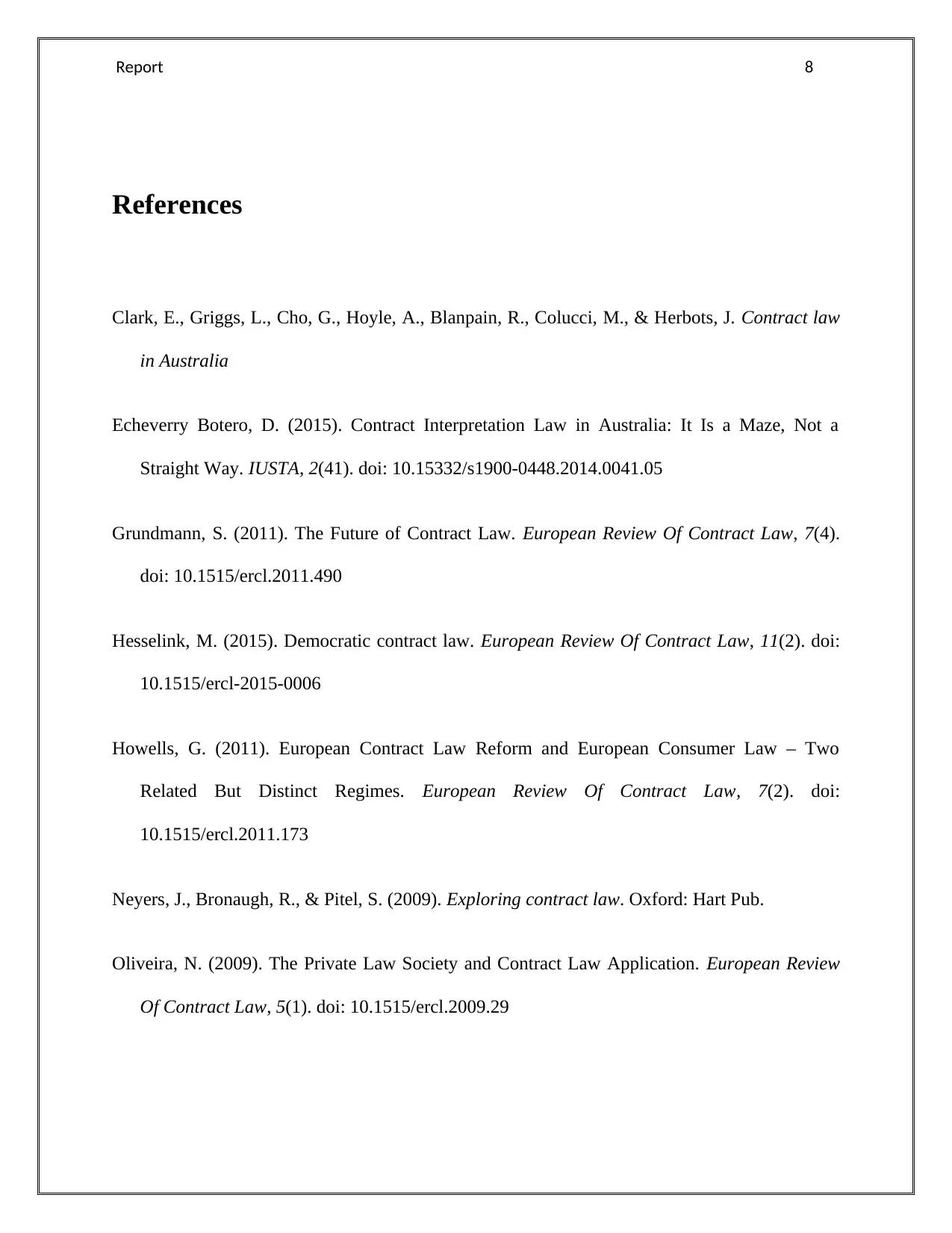
Report 8
References
Clark, E., Griggs, L., Cho, G., Hoyle, A., Blanpain, R., Colucci, M., & Herbots, J. Contract law
in Australia
Echeverry Botero, D. (2015). Contract Interpretation Law in Australia: It Is a Maze, Not a
Straight Way. IUSTA, 2(41). doi: 10.15332/s1900-0448.2014.0041.05
Grundmann, S. (2011). The Future of Contract Law. European Review Of Contract Law, 7(4).
doi: 10.1515/ercl.2011.490
Hesselink, M. (2015). Democratic contract law. European Review Of Contract Law, 11(2). doi:
10.1515/ercl-2015-0006
Howells, G. (2011). European Contract Law Reform and European Consumer Law – Two
Related But Distinct Regimes. European Review Of Contract Law, 7(2). doi:
10.1515/ercl.2011.173
Neyers, J., Bronaugh, R., & Pitel, S. (2009). Exploring contract law. Oxford: Hart Pub.
Oliveira, N. (2009). The Private Law Society and Contract Law Application. European Review
Of Contract Law, 5(1). doi: 10.1515/ercl.2009.29
References
Clark, E., Griggs, L., Cho, G., Hoyle, A., Blanpain, R., Colucci, M., & Herbots, J. Contract law
in Australia
Echeverry Botero, D. (2015). Contract Interpretation Law in Australia: It Is a Maze, Not a
Straight Way. IUSTA, 2(41). doi: 10.15332/s1900-0448.2014.0041.05
Grundmann, S. (2011). The Future of Contract Law. European Review Of Contract Law, 7(4).
doi: 10.1515/ercl.2011.490
Hesselink, M. (2015). Democratic contract law. European Review Of Contract Law, 11(2). doi:
10.1515/ercl-2015-0006
Howells, G. (2011). European Contract Law Reform and European Consumer Law – Two
Related But Distinct Regimes. European Review Of Contract Law, 7(2). doi:
10.1515/ercl.2011.173
Neyers, J., Bronaugh, R., & Pitel, S. (2009). Exploring contract law. Oxford: Hart Pub.
Oliveira, N. (2009). The Private Law Society and Contract Law Application. European Review
Of Contract Law, 5(1). doi: 10.1515/ercl.2009.29
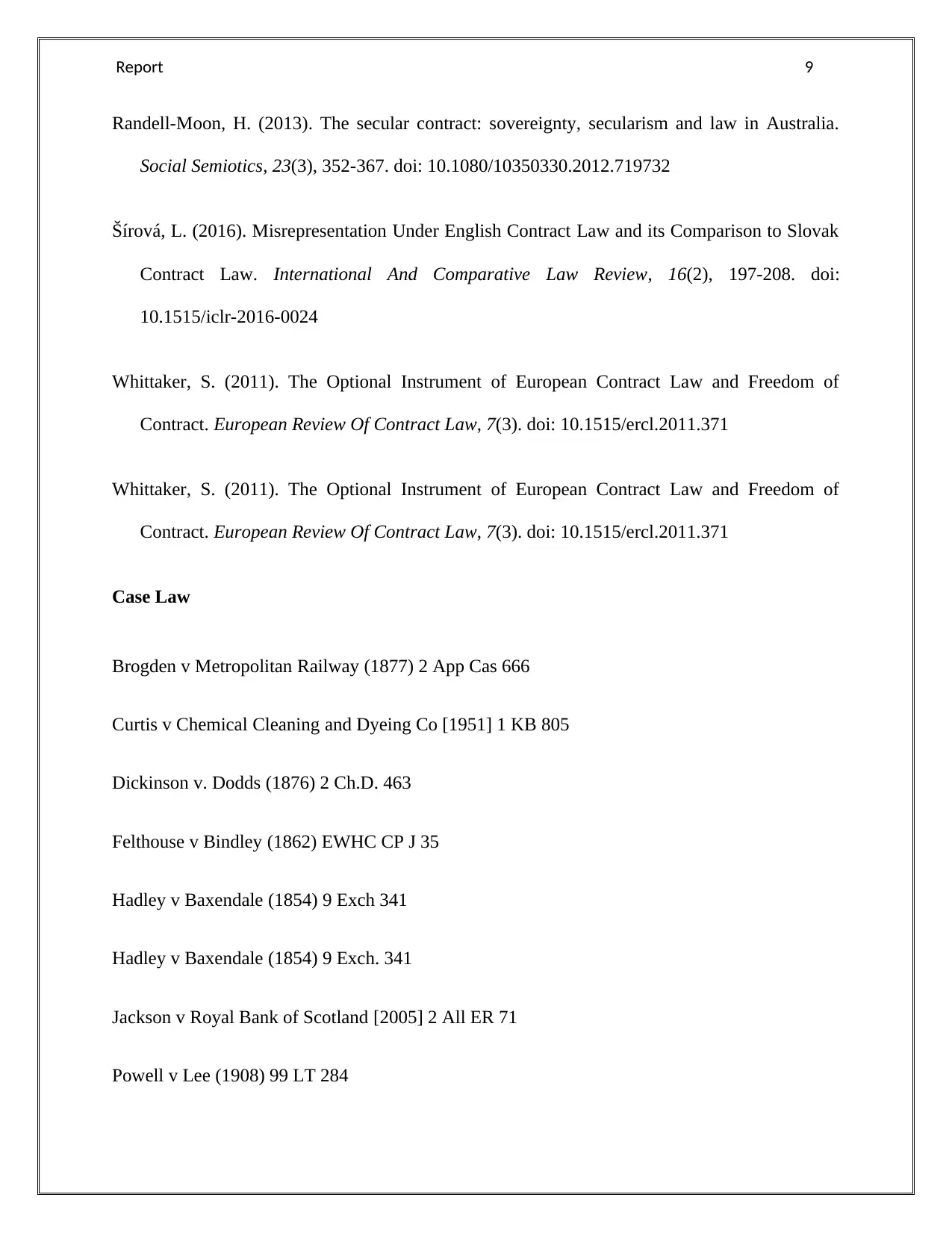
Report 9
Randell-Moon, H. (2013). The secular contract: sovereignty, secularism and law in Australia.
Social Semiotics, 23(3), 352-367. doi: 10.1080/10350330.2012.719732
Šírová, L. (2016). Misrepresentation Under English Contract Law and its Comparison to Slovak
Contract Law. International And Comparative Law Review, 16(2), 197-208. doi:
10.1515/iclr-2016-0024
Whittaker, S. (2011). The Optional Instrument of European Contract Law and Freedom of
Contract. European Review Of Contract Law, 7(3). doi: 10.1515/ercl.2011.371
Whittaker, S. (2011). The Optional Instrument of European Contract Law and Freedom of
Contract. European Review Of Contract Law, 7(3). doi: 10.1515/ercl.2011.371
Case Law
Brogden v Metropolitan Railway (1877) 2 App Cas 666
Curtis v Chemical Cleaning and Dyeing Co [1951] 1 KB 805
Dickinson v. Dodds (1876) 2 Ch.D. 463
Felthouse v Bindley (1862) EWHC CP J 35
Hadley v Baxendale (1854) 9 Exch 341
Hadley v Baxendale (1854) 9 Exch. 341
Jackson v Royal Bank of Scotland [2005] 2 All ER 71
Powell v Lee (1908) 99 LT 284
Randell-Moon, H. (2013). The secular contract: sovereignty, secularism and law in Australia.
Social Semiotics, 23(3), 352-367. doi: 10.1080/10350330.2012.719732
Šírová, L. (2016). Misrepresentation Under English Contract Law and its Comparison to Slovak
Contract Law. International And Comparative Law Review, 16(2), 197-208. doi:
10.1515/iclr-2016-0024
Whittaker, S. (2011). The Optional Instrument of European Contract Law and Freedom of
Contract. European Review Of Contract Law, 7(3). doi: 10.1515/ercl.2011.371
Whittaker, S. (2011). The Optional Instrument of European Contract Law and Freedom of
Contract. European Review Of Contract Law, 7(3). doi: 10.1515/ercl.2011.371
Case Law
Brogden v Metropolitan Railway (1877) 2 App Cas 666
Curtis v Chemical Cleaning and Dyeing Co [1951] 1 KB 805
Dickinson v. Dodds (1876) 2 Ch.D. 463
Felthouse v Bindley (1862) EWHC CP J 35
Hadley v Baxendale (1854) 9 Exch 341
Hadley v Baxendale (1854) 9 Exch. 341
Jackson v Royal Bank of Scotland [2005] 2 All ER 71
Powell v Lee (1908) 99 LT 284
⊘ This is a preview!⊘
Do you want full access?
Subscribe today to unlock all pages.

Trusted by 1+ million students worldwide

Report 10
Smith, Hogg & Co. v. Black Sea Insurance [1940] A. C. 997
Thornton v Shoe Lane Parking Ltd [1970] EWCA Civ 2
Smith, Hogg & Co. v. Black Sea Insurance [1940] A. C. 997
Thornton v Shoe Lane Parking Ltd [1970] EWCA Civ 2
1 out of 10
Related Documents
Your All-in-One AI-Powered Toolkit for Academic Success.
+13062052269
info@desklib.com
Available 24*7 on WhatsApp / Email
![[object Object]](/_next/static/media/star-bottom.7253800d.svg)
Unlock your academic potential
Copyright © 2020–2025 A2Z Services. All Rights Reserved. Developed and managed by ZUCOL.





